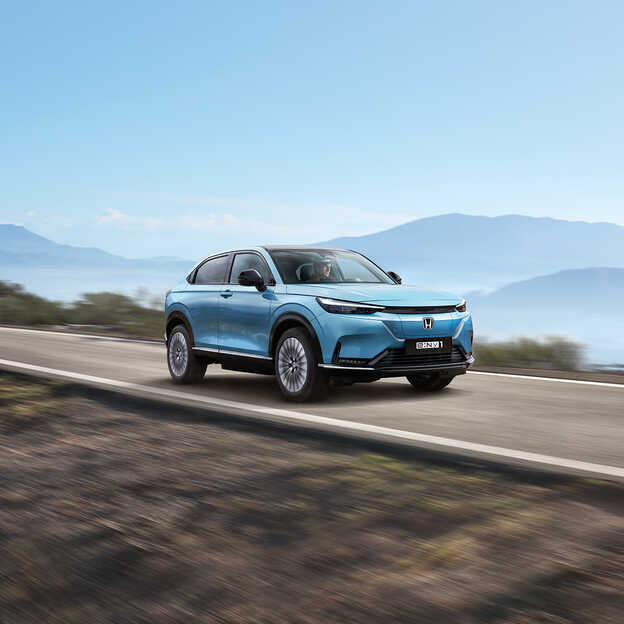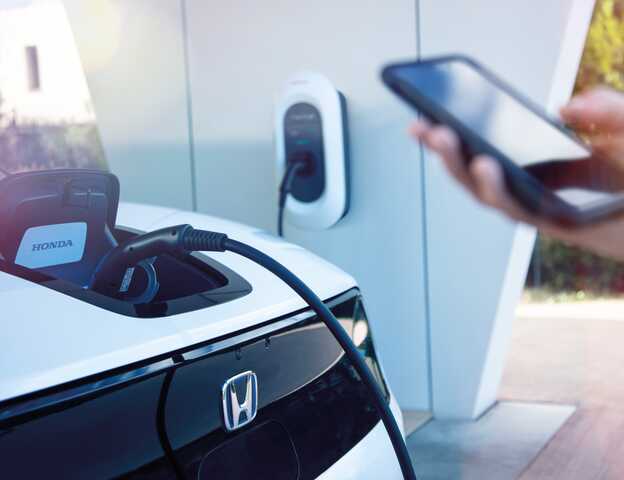How long does it take to charge an electric car?
Wondering how long it takes to charge an electric car? We’ve got the answers. Discover everything you need to know about charge speeds, public and home charging options, and the different factors that affect EV charging times.
Read on to find out more.
How long does it take to charge an EV?
Electric car charging times can vary, taking anywhere from 30 minutes to 12 hours. Plus, you’ll see different results depending on the size of your battery and the charge point output. While slower, charging overnight at home can reduce electricity costs—especially if your energy provider offers off-peak tariffs.
- Large car batteries and low-power charge points are two of the biggest contributors to slower charge times.
- Charging from mains power may take longer than any other charge point, as its power output is usually only 3.7kW. This could take a 60 kWh battery almost 16 hours to charge.
- Using a 7kW home charger could charge the same vehicle in as little as eight hours from empty, and most homes can easily support this.
- Depending on your driving habits, you may not be charging from empty every day.
- High-powered electric charging points are publicly available to you. These can range from 50kW, all the way to 100+ kW, and can charge your vehicle in around 30 minutes.
What factors affect your electric car’s charging speed?
Many factors can affect EV charging times. While some make sense, others might catch you by surprise. Knowing what these are can help you optimise your car’s charging routine and avoid unnecessary energy use.
Battery size
The battery size is one of the most important measures of your EV’s charging time. The larger it is, the longer it will take to charge.
Battery charge
Charging the battery from empty takes longer than recharging it from partially full.
Capped charging rate of the vehicle
Most manufacturers limit your electric car’s charging speed. So, regardless of what charger you use, you won’t be able to exceed this value.
Capped charging rate of the charge point
Charge points may have charging rate caps. So again, regardless of what charger you use, you won’t be able to exceed that value.
Temperature
The charging time and capacity of your electric car’s battery might be slower during colder weather, as well as during extremely hot spells.
How fast do electric cars charge?
There’s no catch-all solution for determining charge time to the minute. With weather, charge rates, battery deterioration, and your driving habits, it’s hard to say how long things will take. But it’s possible to get a good idea. While generalised, the examples in this EV charging time chart should give an idea of your average charge time. These assume a healthy battery, ideal weather, and charging your battery from 0-100%.
107 kWh
28h
15h17m
4h51m
2h
0h40m
83.7 kWh
25h13m
13h20m
4h14m
1h52m
0h37m
77 kWh
23h7m
12h13m
3h53m
1h42m
0h34m
74 kWh
22h13m
11h44m
3h44m
1h38m
0h32m
67 kWh
20h7m
10h38m
3h23m
1h29m
0h29m
Disclaimer: This data is based on the most common EV battery sizes at the time of writing. Figures have been worked out using optimum outside temperatures and a new battery charged from 0% to 100%. https://www.homechargingstations.com/ev-charging-time-calculator/
How to estimate EV charging times
While most manufacturers will probably have manuals and webpages to confirm the time to charge, it’s possible to figure out an estimate yourself by doing this:
- Get your battery size
- Divide it by the charging speed
- The result is your time to charge
While there are a lot of numbers, it shows that, in general, charge times can take anywhere from 30 minutes to 28 hours, depending on the chargers you use. The lower the charging power, the longer it takes to fully charge, with the difference in charge times increasing significantly as power levels decrease.
Public vs home EV charging
Depending on your lifestyle, you may use one of these options more than the other. While home charging can be convenient, it’s often slower than public charging. However, public charging may be more expensive or require you to sign up to an app to access it.
How long does it take to charge an electric car at home?
Your electric car's charging time at home will often be slower. It is better done overnight for anything more than a quick power top-up. Home charger’s kW power options include:
- 3.7 kW – on average, these will take 20 to almost 30 hours to charge.
- 7 kW – are the highest recommended home charge points, with EV charging times expected between 10 and 15 hours on average.
- 22 kW – these are rare, expensive to fit, and require a 3-phase home electricity supply that can support them. They’re mostly seen for Tesla models.
 08E90-TYF-G00A.jpg)
How long does it take to charge an electric car at a public charging station?
Public charge points offer fast charging for electric cars, perfect if you need to top up during a long journey. However, they may not be ideal for charging from empty to full, depending on how you plan to spend your day. Charge times can vary based on power. The two most common charge types are:
- 50 kW – these can reduce EV charging times to less than two hours, even with a large battery.
- 150 kW – while rarer, 150 kW charge points will top up a battery from empty in less than an hour.
What is top-up charging?
One of the most convenient ways to charge your vehicle is to do so while parked. That may be overnight, at work, or while at the gym or shopping for groceries. Many car parks offer charge points. The benefits of this include:
- You never have to worry about running empty, making it incredibly convenient.
- If the charge point is free to use, you could reduce your electricity costs compared to charging at home.
- Many public charge points in parking locations are lower powered, making them ideal for prolonged charging.
How much range do you get per hour of charging?
The amount of range you get per hour of charging will depend on the specific vehicle. With a rapid charger of 50kW or more, you can usually add up to 100 miles of range with a charge of around 35 to 45 minutes. As an example, the Honda e:Ny1 has a maximum charging speed of 78kW and can be charged from 10% to 80% in 45 minutes, giving you almost 200 miles of range.
Electric car charging times: FAQs
How long can an electric car sit without charging?
While this will depend on your vehicle, an EV can sit for months without charging. Your battery level can also impact the time your vehicle retains its charge, and, contrary to what you may think, a charge of around 50% is ideal.
How long will an electric car run on a full charge?
Your electric car’s run time will depend on a few factors, mostly related to your battery’s size and its condition. Generally, this is determined by range, which is the number of miles your vehicle can run compared to its charge. Older EVs, on average, will run for 160km, though more modern vehicles can range from 400km to 560km.
Do electric cars charge while driving?
No, though there’s a caveat to this. EVs are energy-negative while driving, but regenerative braking can restore some of the lost energy. This makes them more energy efficient, but doesn’t constitute self-charging. Think of it more as partial recycling.
How long do electric car batteries last?
On average, electric car batteries last more than 160,000km or roughly 15-20 years. However, there are reports of EVs lasting for more than 320,000km.
Can top-up charging ruin your EV battery?
Generally, no top-up charging should ruin your EV battery. Most battery management systems have countermeasures for constant fast charging, and many vehicles have innate caps to protect their batteries. However, in some instances, it may be worth charging it less than 100% to preserve battery health.
Can you sit in an EV while charging?
An EV is safe to sit in while charging. But if you rely on any electric device for your health, such as a pacemaker, it’s recommended that you don’t sit in the vehicle while it’s charging. The electromagnetic fields could interfere with the device’s function. If you’re in any doubt about this, seek advice from a medical professional.
What happens if an electric car runs out of battery?
If your EV runs out of battery power, it will act in the same way as a petrol car running out of fuel – it will slow down and eventually stop running when all the power is exhausted.
However, EVs give the driver plenty of warning that this is about to happen, so you should have plenty of time to reach a charging station. You will also get a range estimate when the battery starts to run low to help you plan ahead. Many EVs also have what is called a “limp mode”, which means they will continue to run for a short time on minimal power to help you reach a charger in an emergency.
How much does it cost to charge an electric car in public?
The cost of charging an electric car in public will vary depending on the type of battery, the type of charger and the rates charged by the service provider.
Rapid chargers are typically the most expensive to use but can recharge your battery from empty to full in as little as 30 minutes. Charging at home is usually the cheapest option, but it also takes much longer. The upside is that you can plug in overnight and wake up to a fully charged battery in the morning. Some retailers also offer free charging, most often at places such as supermarkets.
How far will electric cars go?
Electric cars typically travel between 320 km and 480 km on a full battery. The Honda e:Ny1 offers a range of up to 412 km on a single charge. However, factors such as weather conditions, driving speed, and the use of interior heating or air conditioning can affect your maximum range.
Do you still have more questions?
Related reading
Honda Electric Range Overview.jpg/_jcr_content/renditions/c2_r.jpg)
29.11.23
How Do Electric Cars Work?
.jpg/_jcr_content/renditions/c2_r.jpg)
29.11.23
How Do Electric Cars Work?

28.11.23
What are the advantages of electric cars?

28.11.23
Advantages and Disadvantages of Electric Cars
.jpg/_jcr_content/renditions/c2_r.jpg)
17.03.23
Are all Electric Cars Automatic?

23.02.23
Can I charge my Electric Car at home?

